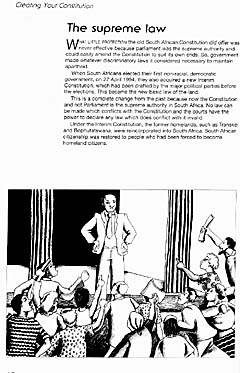 Text:
Text: back to "Company support for initiatives promoting civil and political rights: Shell South Africa"
"The supreme law": Excerpt (page 10) from Ukuphemba Umthethosisekelo Wakho / Creating Your Constitution, a 171-page Zulu-language / English-language handbook published in 1994 by the Community Law Centre, with support from Shell South Africa. © Copyright 1994 Community Law Centre
[The Community Law Centre has since changed its name to Community Law & Rural Development Centre. It is a South African non-governmental organisation affiliated to the University of Natal.]
 Text:
Text:
"The supreme law
WHAT LITTLE PROTECTION the old South African Constitution did offer was never effective because parliament was the supreme authority and could easily amend the Constitution to suit its own ends. So, government made whatever discriminatory laws it considered necessary to maintain apartheid.
When South Africans elected their first non-racial, democratic government, on 27 April 1994, they also acquired a new interim Constitution, which had been drafted by the major political parties before the elections. This became the new basic law of the land.
This is a complete change from the past because now the Constitution and not Parliament is the supreme authority in South Africa. No law can be made which conflicts with the Constitution and the courts have the power to declare any law which does conflict with it invalid.
Under the Interim Constitution, the former homelands, such as Transkei and Bophutatswana, were reincorporated into South Africa. South African citizenship was restored to people who had been forced to become homeland citizens."